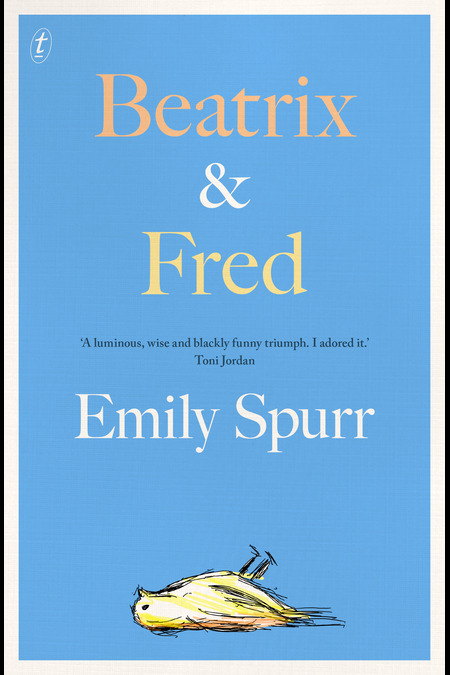(courtesy Text Publishing)
Books that absolutely defy expectations are a gloriously good treat indeed.
You read the back blurb in the bookshop, decide that sounds enticing, grab the book and then after a suitable time on the TBR pile, open it up expecting it to dance to a particular narrative tune … only to find it defies what you thought you were getting on almost every page.
It’s a delight and it’s very much what happened when this reviewer read Beatrix & Fred by Emily Spurr (A Million Things), a novel that is ostensibly about Beatrix, an emotionally troubled younger woman, though not young it must be said, who crosses paths with an 82-yer-old woman named Fred (short for Frederica but do not call her that) who seems to pop up everywhere Beatrix is to an increasingly unsettling degree.
On paper at least, and that it literally how this book was read, it seems to falls snugly and appealingly into the two people with less than ideal lives who find some form of healing or restoration in the other genre; in a world where pain all too often stays as pain and there’s no cessation to be had through relationships or otherwise, these kinds of stories are appealing because they restore our faith in the idea that something good can happen when there’s nothing like that even remotely on the horizon.
To be fair, that’s kind of what Beatrix & Fred is, but the way it approaches its story is so inventive and yes, as the back cover blurb admits “more than slightly weird”, that you will find yourself entranced by just how original and off-the-beaten path this brilliantly compelling and intimately heartfelt story is, not to mention morally complex in ways that will test where your moral centre of gravity sits.
‘It’s not that I don’t feel things.’ Beatrix’s voice bursts out of the dark, startling the sheet-covered figure beside her. ‘It’s not just now. It’s older than that. It’s people–I don’t connect to people.’ Pillow whispers against skin as Beatrix turns her head. ‘ I mean I can. I can say and do the right things. I can even enjoy myself–or I used to. But I always feel like I’m standing back, watching.’
For all its very much welcome weirdness – well, once you adjust to it; at first you will be expecting a standard kind of story because that’s where it appears to be heading until Spurr completely, and rewardingly upsets the apple cart to an emotionally impactful degree you don’t see coming (and which honestly is totally worth it in so many ways) – the power of Beatrix & Fred lies in the way it asks us what real humanity actually looks like.
Beatrix, like pretty much all of us, thinks she has a lock on that, and when she discovers that Fred doesn’t quite fit the mould and in a fairly out-there kind of way, she has to really wrestle with whether her acquaintance then friend then, well Beatrix isn’t sure though the signs are there, is evil, not evil, good, not good and just someone stuck with a certain set of biological imperatives she has to navigate around as best she can.
It’s a fascinating exercise in what makes us what we are and how the choices we make can directly influence things over which we have no control; it also beautifully explores how just because one things has to happen that that doesn’t make us active participants in it and that we might actually have moral issues with something that is central to who we are living beings.
(courtesy Text Publishing)
A love story that is wondrously, fantastically, well, weird – honestly weird is a very good thing generally (we run from it too much as people and we’re the poorer for it) as one character in the book observes and you will come to love it by book’s end – Beatrix & Fred is one of those reads that feels very familiar and yet most extraordinarily not.
As an exercise in how two vastly divergent people meet, get over issues they have with each other – actually it’s Beatrix who has the issues but then she’s not that good with people generally as her love-hate BFF at work Ray will attest and her workmates, who loathe her, will back up – and come to not simply like but love each other, Beatrix & Fred is a joy because it doesn’t pretend relationships are easy, that being human is simple and linear and that the morality that underpins it all is easy to dissect and live by.
Granted some things are and one of the things that initially divides Beatrix and Fred is what appears to be an unassailable issue that the former is horrified by at first but the latter, while acknowledging its darker aspects, sees as both an inescapable fact of her life but also as a strange positive which actually has some enrichingly progressive aspects to it.
The doorbell startler her awake. Beatrix twists her stiff neck, unsure if the faded light is pointing to late or early, and squints at the clock. Time rights itself. The light resolves into the soft glow of early evening. Her fingers pick at a dried track of salt stretching from eye to jaw. The doorbell rings again.
Sure, Beatrix & Fred is dark and intense in places, and it will make you think and wonder how you are suddenly accepting of something that causes Beatrix, and readers by extension, great moral discomfort, but it’s also quirkily warm and funny too, and in the way that all good relationships can be when the pressure is off, fun.
You might wonder how that’s going to creep in at times, especially in the first third or so of the novel when life is not good for Beatrix, propped up barely by a surely attitude, far too much alcohol and symptoms that simply don’t seem to make sense (that is, until they do), but slowly but surely it does, led mainly by the spry wit and offbeat groundedness of Fred who’s exactly the kind of knowledgeable, irascible, take-no-prisoners kindly old soul you want in your corner, and in your life.
Beatrix comes to fully appreciate that over some off-kilter brunches and weirdly transportive outings that help to come to grips with how human Fred actually is, and how her initial assumptions about her ageing friend were erroneous if understandable in their genesis, and as Beatrix & Fred progresses in its own beautifully unexpected way you will come to grapple and then accept some quite extraordinarily moving and complex things.
That’s not to say there aren’t some fiercely intense decisions to make and some ragingly dark issues with which to grapple, and yes Beatrix has some big ethical mountains to climb as she confronts mortality and morality on all kinds of fronts, but Beatrix & Fred is also a story of real love, belonging and acceptance and of how complex and unexpected being alive can be and how maybe, just maybe, the world is a great deal more complex, and yes, weird than we thought and that that might not be such a bad thing.

